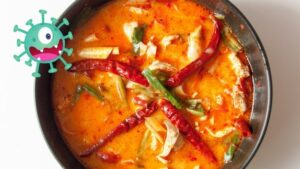If you’ve ever felt lightheaded or woozy after eating spicy food, you’re definitely not alone. Many people experience dizziness and disorientation when indulging in hot peppers or extra zesty buffalo wings. But what exactly causes this dizzy feeling? And is it dangerous?
The short answer is yes – spicy foods can make you temporarily dizzy when your body reacts to compounds called capsaicinoids. Found in chili peppers and hot sauces, capsaicinoids like capsaicin bind to your pain nerves, making your brain think you’re literally on fire!
To cope with the heat, your circulatory system and hormones go into overdrive, causing lightheadedness, vertigo, and other odd sensations. Luckily, these symptoms are harmless for most people and subside within an hour or so.
But why does this happen? What’s going on in your body when you feel that spicy food rush? And how can you prevent or minimize dizzy spells from your favorite hot dishes? This article will explore the science behind feeling dizzy after eating spicy cuisine. We’ll discuss:
- The biological mechanisms that make you dizzy
- Common symptoms to expect
- Whether you can pass out from extreme
spice - Tips to enjoy heat without the head rush
- When to see a doctor about persistent dizziness
So if you love flavorful spicy fare but hate the woozy feeling that comes after, read on! We’ll make sure you can keep satisfying your craving for heat without spinning out of control.
Why Do I Feel Dizzy After Eating Spicy Food?

Spicy foods contain compounds called capsaicinoids that give them their intense, burning flavor. The most common capsaicinoid is capsaicin, which binds to pain receptors on your nerves. This tricks your brain into thinking your mouth is literally on fire!
To cope, your body kicks into overdrive. Your heart starts pumping faster to circulate blood and oxygen. You begin sweating to cool down. And your adrenal glands release cortisol and endorphins – hormones that help reduce pain and create a temporary high.
This flurry of bodily responses is what causes dizziness after eating spicy food. The hormonal rush diverts blood away from your head, reducing blood flow to the brain. Your dropping blood pressure leads to temporary lightheadedness and disorientation.
Some people also theorize that capsaicin may inflame blood vessels or interact with potassium channels in the brain, further contributing to dizziness. But the hormonal response is likely the primary culprit.
Common Dizzy Feelings from Spicy Food
The dizziness you experience can take many forms:
- Lightheadedness
- Vertigo or a spinning sensation
- Feeling faint or unsteady
- Mild detachment from your surroundings
- Difficulty concentrating or cloudy thinking
Luckily, these symptoms are temporary and should pass within minutes to an hour as your body adjusts. But in rare cases, very spicy food can trigger more severe reactions like anxiety, headache, nausea, or ringing in the ears.
Can You Pass Out From Spicy Food?
Passing out after eating spicy food is highly uncommon. But there are a few scenarios where it’s possible:
- You have an allergy or sensitivity to capsaicin or other ingredients. An allergic reaction could cause a dramatic drop in blood pressure leading to fainting.
- You have an underlying health condition. Some heart, nervous system or blood pressure disorders may be exacerbated by spicy food’s effects on circulation. Fainting is an extreme reaction but can happen.
- You ate an exceptionally spicy pepper on an empty stomach. Capsaicin absorption happens more rapidly without food in your system to dilute it. The intensity could briefly overwhelm your body’s equilibrium.
- You’re unaccustomed to eating spicy food. People build up a tolerance to capsaicin over time. If you lack exposure, your body may overreact to even moderately spicy dishes.
Unless you have a known medical issue, passing out from spicy food is very rare. Feeling lightheaded or vertigo is much more likely. But if you do faint, seek medical care to determine if an underlying condition needs addressed.
Tips to Prevent Dizziness from Spicy Food
If you want to keep enjoying your buffalo wings without the room spinning, here are some tips:
- Eat spicy food with other bland items like rice, bread or yogurt. The carbs and protein can help absorb capsaicin and stabilize blood sugar.
- Stay hydrated. Drink water before, during and after eating spicy dishes to counter fluid loss from sweating.
- Limit alcohol intake, which can amplify capsaicin’s effects and dehydrate you further.
- Build a tolerance gradually. Don’t go from 0 to 100 overnight on the Scoville scale. Let your body adapt to
spice levels slowly. - Choose fats wisely. Dairy-based foods like cheese can help temper heat better than oils.
- Opt for sweeter spicy foods. The sugar helps counterbalance the burn instead of enhancing it.
- Eat a full, balanced meal so your blood sugar doesn’t crash.
- Wait between spicy dishes to allow your body to reset.
- Sit down and relax while eating spicy food to avoid potential fainting.
When to See a Doctor
In most cases, dizziness from spicy food is no cause for concern. But if you experience:
- Prolonged vertigo or fainting
- Regular dizzy spells unrelated to meals
- Headaches, vomiting or other concerning symptoms
- Known heart or blood pressure problems
…be sure to make an appointment with your doctor. They can help identify if an underlying condition is contributing to your dizziness and recommend treatment options.
With some wise precautions, you can keep enjoying the thrill of spicy cuisine without the unpleasant side effects. But don’t hesitate to have your health evaluated if symptoms persist.
Why Some Crave Spicy Foods
For spicy food aficionados, the buzz and rush of heat from capsaicin-laden dishes can become addictive. The excitement of challenging one’s tolerance and pushing the boundaries of what tastes painfully hot versus pleasurably pungent is thrilling for many.
Research suggests this addictive response to spicy heat is rooted in the brain’s pleasure and reward centers. When you eat spicy food, your brain releases “feel good” chemicals like dopamine, endorphins, and serotonin to help cope with the perceived threat of the spicy burn. These chemicals generate a high and buzz that chile-heads find very enjoyable.
Brain imaging studies show that the rush and thrill of spicy foods lights up regions like the nucleus accumbens – an area closely tied to processing pleasure and reward. The nucleus accumbens is also activated by other exciting or addictive behaviors like gambling, risk-taking, and engagement in extreme sports.
So while not a true chemical addiction, the obsessive chase after ever-hotter peppers and push to raise one’s
Of course, moderation is wise with spicy fare as with any thrill-seeking activity. But understanding the science behind the addictive pull of fiery foods helps explain why some pepper purists just can’t get enough. The spicy rush can be a hard habit to break!
Regional and Cultural Differences in Spicy Food Tolerance

Our likelihood of feeling dizzy or overwhelmed from spicy food is largely dependent on the regional cuisine we grew up with. Tolerance for pungent peppers and spicy heat varies greatly around the globe.
In regions like India, Mexico, Thailand, Korea, and parts of Africa and the Caribbean, fiery spices and hot chilies are staple ingredients. Small children are exposed to moderately spicy fare from a very young age. When you build tolerance early, you are less likely to be phased by the dizzying effects of chilies as an adult.
Meanwhile, cultures like Europe and North America tend to favor more subtle, less peppery flavors. Children in these regions may grow up eating blander food and have minimal exposure to pungency. As a result, these populations are overall less tolerant of spicy heat.
The spectrum of spicy cuisine across cultures is extreme. The spiciest dishes in Thailand or India would be intolerably fiery for most Westerners. But for natives of these regions, the burning heat provides an integral kick of flavor they crave.
So while spicy food can make anyone dizzy in theory, your cultural background and the regional palette you grew up with plays a big role. If you were raised on mild flavors, you may need to expose your taste buds gradually and build tolerance over time to avoid an unpleasant head rush.
The Bottom Line
For spicy food lovers, dizziness is often just part of the experience. A temporary rush comes with the burn. While passing out is very rare, feeling lightheaded or dizzy after eating hot peppers or spicy dishes is fairly common.
The cause boils down to your body’s hormonal and circulatory response to capsaicin and the illusion of heat. Luckily, the symptoms are short-lived and relatively harmless for otherwise healthy individuals. With some preparation, you can continue satisfying your craving for flavorful heat without spinning out of control.
So next time you take the dare of eating a Carolina Reaper or dining on volcanic chicken wings, you can brace yourself for the buzz ahead. Stay hydrated, grab a glass of milk, and brace yourself for the momentary rush – then you can kick back and enjoy the spicy thrill!




